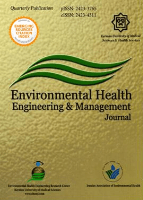
Environmental Health Engineering and Management Journal
Scope & Guideline
Innovating Strategies for Environmental Health Management
Introduction
Aims and Scopes
- Environmental Health Risk Assessment:
The journal places a strong emphasis on assessing health risks associated with environmental exposures, including pollutants and hazardous materials. This involves epidemiological studies, risk modeling, and health surveillance. - Pollution and Contamination Studies:
Research on the sources, types, and effects of pollutants, including heavy metals, microplastics, and organic contaminants in various media (air, water, soil) is a core focus. This includes studies on the ecological impact and human health implications of such contaminants. - Innovative Waste Management Solutions:
The journal promotes research on innovative methods for waste management and treatment, including anaerobic digestion, electrocoagulation, and bioremediation techniques aimed at reducing environmental impact and enhancing sustainability. - Climate Change and Environmental Health:
Publications often explore the effects of climate change on health and environmental quality, including studies on air quality, heat stress, and water security, highlighting the need for adaptive management strategies. - Sustainable Practices and Technologies:
The journal supports research into sustainable technologies and practices that mitigate environmental hazards, including renewable energy, bioengineering, and the use of indigenous resources in environmental management.
Trending and Emerging
- Health Impacts of Emerging Contaminants:
There is an increasing focus on the health effects of emerging contaminants, such as microplastics and pharmaceuticals, in various environments. This trend signifies a growing recognition of the need for research on novel pollutants that were previously under-studied. - COVID-19 and Environmental Health Intersections:
Research linking the COVID-19 pandemic to environmental health issues, such as air quality and waste management, has surged. This reflects a broader understanding of how public health crises can influence and be influenced by environmental factors. - Spatial Analysis and Geographic Information Systems (GIS):
The use of spatial analysis and GIS in studying environmental health has gained traction. This approach allows for better assessment of exposure risks and health outcomes based on geographical data, enhancing the precision of environmental health studies. - Sustainable and Green Technologies:
A noticeable increase in research on sustainable technologies, including renewable energy solutions and eco-friendly waste treatment methods, indicates a shift towards sustainability in environmental health engineering. - Socioeconomic Factors in Environmental Health:
Emerging themes emphasize the interplay between socioeconomic factors and environmental health outcomes, highlighting how income inequality and social determinants impact exposure and health risks.
Declining or Waning
- Traditional Pollution Control Methods:
Research focusing solely on conventional pollution control methods has seen a decrease. The trend has shifted towards integrating advanced technologies and sustainable practices rather than relying on traditional approaches. - Generalized Environmental Impact Studies:
Broad, non-specific studies assessing environmental impacts without a clear focus on health outcomes are becoming less common. There is a growing preference for targeted research that directly links environmental issues to specific health risks. - Historical Environmental Health Issues:
Studies centered around historical contamination events or legacy pollutants are less frequently published. Current research tends to focus on contemporary and emerging pollutants, reflecting the need to address immediate health risks.
Similar Journals
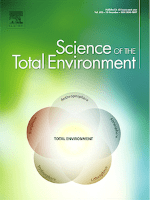
Science of The Total Environment
Leading the Way in Environmental Research ExcellenceScience of The Total Environment, an esteemed journal published by Elsevier, holds a significant position in the field of environmental science, encompassing critical areas such as Environmental Chemistry, Environmental Engineering, Pollution, and Waste Management and Disposal. With an impressive impact factor and ranked in the Q1 quartile across its categories for 2023, the journal is recognized for its high-quality research output and contribution to environmental sustainability. Operating from its base in the Netherlands, the journal has been a valuable resource since its inception in 1972, welcoming innovative studies that address complex environmental challenges. Its notable rankings—such as Rank #9 in both Environmental Sciences and Pollution—underscore its relevance and influence in the academic community. Although the journal currently does not provide an open access option, the robust findings and discussions presented within its pages continue to foster a deeper understanding of environmental issues. Science of The Total Environment is an essential platform for researchers, professionals, and students dedicated to advancing knowledge and solutions in the rapidly evolving field of environmental science.
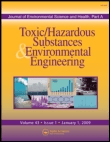
JOURNAL OF ENVIRONMENTAL SCIENCE AND HEALTH PART A-TOXIC/HAZARDOUS SUBSTANCES & ENVIRONMENTAL ENGINEERING
Connecting science and health to combat environmental hazards.JOURNAL OF ENVIRONMENTAL SCIENCE AND HEALTH PART A-TOXIC/HAZARDOUS SUBSTANCES & ENVIRONMENTAL ENGINEERING, published by TAYLOR & FRANCIS INC, stands at the forefront of research in the dynamic fields of environmental science and public health. With an ISSN of 1093-4529 and an E-ISSN of 1532-4117, this journal serves as a pivotal platform for disseminating significant findings regarding toxic substances and their impact on the environment and human health. It is categorized in the Q3 quartile for both Environmental Engineering and Medicine in 2023, showcasing its relevance within these disciplines. Researchers will find valuable insights in the 90th rank among 197 in the Environmental Science and Engineering category, placing it in the 54th percentile among its peers. While access options remain traditional rather than open-access, the journal is dedicated to serving as an essential resource for professionals and academics engaged in understanding the intricate connections between hazardous materials and environmental safety. The journal has consistently published critical research since its inception in 1978 and is committed to advancing knowledge up to 2024, making it a crucial venue for ongoing discussions and developments in environmental health.

Journal of Environmental Health Science and Engineering
Pioneering research for a healthier, more sustainable future.Journal of Environmental Health Science and Engineering, published by Springer, stands at the forefront of scholarly research in environmental health and engineering. With an impressive E-ISSN of 2052-336X and a significant impact factor reflected in its Q2 quartile rankings across various essential categories—including Applied Microbiology, Environmental Engineering, and Public Health—the journal serves as a vital platform for disseminating high-quality research from 2012 to 2024. Its rankings in fields such as Environmental Science and Waste Management position it as a distinguished resource for professionals and academics aiming to advance their understanding of contemporary environmental challenges. As an open-access journal based in Switzerland, it champions accessibility and collaboration, allowing researchers to share insights that influence policy and practical applications in environmental health. The journal's commitment to fostering innovative research makes it indispensable for those dedicated to enhancing the intersection of environmental science and public health.
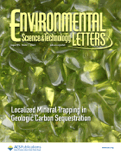
Environmental Science & Technology Letters
Transforming research into actionable environmental solutions.Environmental Science & Technology Letters, published by the American Chemical Society, stands as a premier journal in the realm of environmental science and technology, focusing on pivotal studies that address pressing environmental challenges. With an impressive Q1 ranking in multiple categories including Ecology, Environmental Chemistry, and Pollution, this journal maintains a position of excellence within its field, achieving Scopus ranks that place it in the top percentile of Environmental Science disciplines. Although not open access, Environmental Science & Technology Letters offers vital insights and cutting-edge research that contribute significantly to the understanding and management of environmental issues. The journal’s objectives include disseminating ground-breaking findings and promoting discussions that lead to sustainable solutions. With convergence from 2013 to 2024, it continues to serve as an essential resource for researchers, professionals, and students committed to advancing knowledge and innovation in environmental science.

Rocznik Ochrona Srodowiska
Catalyzing Sustainable Practices through Rigorous ResearchRocznik Ochrona Srodowiska, published by the Middle Pomeranian Scientific Society for Environmental Protection, is an esteemed journal dedicated to advancing the field of environmental science in Poland and beyond. With an ISSN of 1506-218X, this peer-reviewed journal has established itself as a vital resource since its inception in 2007, addressing various environmental issues and promoting sustainable practices. Currently holding a Q3 category ranking in the Environmental Science (miscellaneous) field for 2023, it places itself in the 23rd percentile of Scopus rankings, reflecting a growing influence in the broader environmental research community. While the journal is not open access, it serves as an important conduit for researchers, professionals, and students to disseminate their findings and contribute to the interdisciplinary dialogue aimed at tackling pressing environmental challenges. With a commitment to rigorous research and practical applications, Rocznik Ochrona Srodowiska remains an essential platform for fostering innovation and collaboration in environmental studies.

WATER AIR AND SOIL POLLUTION
Uniting science and technology to tackle environmental challenges.Water Air and Soil Pollution is a leading peer-reviewed journal published by Springer International Publishing AG, focusing on the vital fields of environmental sciences, ecological modeling, and pollution management. Since its inception in 1971, the journal has contributed significantly to advancing knowledge in the interdisciplinary realms of Water Science and Technology, Environmental Chemistry, and Environmental Engineering. With an impressive history, the journal currently holds a Q2 quartile ranking in several categories, reflecting its high impact and relevance in these essential areas of research. Its rankings—such as #95 in Environmental Science: Water Science and Technology—illustrate its standing in the academic community. Researchers and practitioners alike can access a wealth of studies and reviews that aim to address pressing environmental concerns and foster sustainable practices, although the journal is not Open Access. Located in Switzerland, Water Air and Soil Pollution continues to be a critical resource for those dedicated to understanding and mitigating pollution, making it an indispensable tool for anyone engaged in ecological and environmental research.

Journal of Hazardous Materials Advances
Championing accessibility in hazardous materials scholarship.The Journal of Hazardous Materials Advances, published by ELSEVIER, is a premier open-access journal dedicated to advancing the understanding and management of hazardous materials. Established in 2021, this journal has quickly gained recognition, securing a place in the prestigious Q1 quartile across multiple categories, including Environmental Chemistry, Environmental Engineering, Health, Toxicology and Mutagenesis, Pollution, and Waste Management and Disposal. With its impactful research indexed under ISSN 2772-4166, the journal not only prioritizes quality but also promotes accessibility to its scholarly outputs, ensuring that vital findings are readily available to the global research community. As part of Scopus, the Journal ranks competitively in various subfields of Environmental Science, reflecting its vital role in addressing contemporary environmental challenges. Researchers, professionals, and students can rely on this journal to provide innovative insights and solutions in the ever-evolving landscape of hazardous material management and its implications for public health and environmental sustainability.
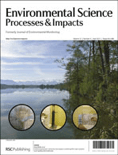
Environmental Science-Processes & Impacts
Advancing knowledge for a sustainable tomorrow.Environmental Science-Processes & Impacts is a premier journal published by the Royal Society of Chemistry, focusing on critical research in the field of environmental science. With ISSN 2050-7887 and E-ISSN 2050-7895, this journal has established itself as an authoritative source of knowledge since its inception in 2012, maintaining a remarkable Q1 quartile ranking across significant categories such as Environmental Chemistry, Management, Monitoring, Policy and Law, Medicine, and Public Health for the year 2023. It stands as an essential resource for professionals, researchers, and students, aimed at advancing scientific understanding and solutions to pressing environmental issues. With impressive ranks in Scopus, including #45 in Public Health and #27 in Environmental Chemistry, the journal provides a platform for impactful research and interdisciplinary collaboration, emphasizing open access to foster the dissemination of knowledge globally. Join a community committed to exploring the interconnectedness of environmental processes and their implications for society by contributing to or learning from cutting-edge studies published in this esteemed journal.

Frontiers of Environmental Science & Engineering
Unveiling cutting-edge methodologies for a sustainable tomorrow.Frontiers of Environmental Science & Engineering is a premier journal published by HIGHER EDUCATION PRESS that stands at the forefront of interdisciplinary research in environmental science and engineering. Established in 2013 and converging its scope through 2024, this journal has swiftly ascended to a notable Q1 category in the Environmental Science (Miscellaneous) segment, highlighting its remarkable impact and relevance. With a Scopus ranking of 27 out of 233 in its field, placing it within the top 88th percentile, it serves as a crucial platform for disseminating cutting-edge research, innovative methodologies, and pressing environmental concerns. Researchers, professionals, and students alike will find valuable insights and opportunities for collaboration within its pages. While the journal operates under a subscription model, its commitment to advancing the field makes it an essential resource for those dedicated to addressing the world's environmental challenges, fostering sustainable practices, and pioneering engineering solutions.
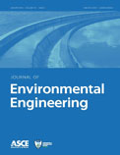
JOURNAL OF ENVIRONMENTAL ENGINEERING
Elevating the dialogue on pressing environmental challenges.JOURNAL OF ENVIRONMENTAL ENGINEERING, published by the American Society of Civil Engineers (ASCE), stands as a pivotal platform within the realm of environmental engineering and civil infrastructure. With an ISSN of 0733-9372 and an E-ISSN of 1943-7870, this esteemed journal has been delivering high-quality research since its inception in 1973 and continues to play a crucial role in advancing knowledge through to 2024. The journal boasts respectable impact factors, achieving Q2 rankings in Civil and Structural Engineering, Environmental Engineering, and Environmental Science, while also maintaining a solid presence in Environmental Chemistry. With Scopus rankings reflecting a strong competitive advantage across various specializations, it serves as a vital resource for researchers, professionals, and students focused on solving complex environmental challenges. Though not an open-access publication, its rigorous selection process ensures that only high-caliber studies are disseminated, making it an indispensable read for anyone involved in the interdisciplinary fields linking engineering and environmental sustainability. Addressing contemporary issues and shaping future innovations, the JOURNAL OF ENVIRONMENTAL ENGINEERING remains committed to fostering dialogue and disseminating impactful research.